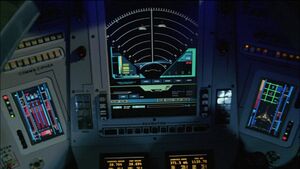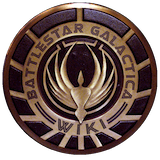No edit summary |
m Text replacement - "Caprica Six" to "Caprica-Six" |
||
| (64 intermediate revisions by 25 users not shown) | |||
| Line 1: | Line 1: | ||
{{disline|This article details how the [[Cylons (RDM)|Cylons]] compromised [[Colonial Fleet (TRS)|Colonial Fleet]] defenses by cracking the Colonial flight operating system in the [[Re-imagined Series]].}} | |||
{{disline|For other related computer or biological attacks, see [[Virus]].}} | |||
The | Developed by computer scientist [[Gaius Baltar]], the '''Command Navigation Program''' (CNP) is an operating system<ref>The Command Navigation Program is an [[W:Operating system|operating system]] akin to the [[W:Microsoft Windows|Microsoft Windows]], [[W:Linux|Linux]] and [[W:Mac OS X|Mac OS X]] operating systems on today's personal computers. However, [[Number Six]]'s additions integrate backdoor access points that allow the Cylons remote access.</ref> utilized by the [[Colonial Fleet (TRS)|Colonial Fleet]] and some civilian spaceships in the [[The Twelve Colonies of Kobol|Twelve Colonies of Kobol]].<ref>[[Aaron Doral]] provides a requested report to [[Gaius Baltar]] in [[CIC]]: "You asked for a report on how many civilian ships had your CNP program?" {{TRS|Miniseries, Night 2}}.</ref> | ||
Installed in the central computers of [[Viper Mark VII|Vipers]] and [[Raptor]]s and in the [[Computers#Navigation computer|navigation computers]] of almost all battlestars, the CNP's development began around {{BCH|2}}. | |||
==Backdoors== | |||
[[Image:ViperMk7Avionics.jpg|left|thumb|The CNP managed the [[Computers in the Re-imagined Series#Avionics|avionics]] of [[Viper Mark VII]]s and almost all [[Mercury class battlestar|battlestars]] before the few fighters that survived were retrofitted after the [[Fall of the Twelve Colonies|attack]].]] | |||
Unbeknownst to Dr. Baltar, his lover and co-writer of the CNP turns out to be a version of the [[humanoid Cylon]] [[Caprica-Six|Number Six]]. The Cylon infiltrator programmed backdoors into the CNP so that the Cylon attack forces could render any ships that use the operating system to shut itself down by a remote command. | |||
[[Category:A to Z]] [[Category:RDM]] [[Category:Technology]] [[Category:Terminology]] | Battlestars and fighters begin to shut down during the Colonial defensive "as if a switch were flipped."<ref>The process is similar to how some home and business computers today can be [[w:Zombie computer|taken over secretly and remotely]] for use in nefarious purposes on the Internet, such as [[w:E-mail spam|email spamming]].</ref> Communications officer [[Anastasia Dualla]] describes reports of "system failures" throughout the Fleet and how at least one battlestar loses power when the attack begins {{TRS|Miniseries, Night 1}}. When the Cylon fleet jumps in during the [[Fall of the Twelve Colonies]], they use the CNP to take down an entire battlegroup over Caprica as well as the defense mainframe, leaving ships drifting out of control and easy targets {{TRS|The Plan}}. | ||
<br clear="all"> | |||
==Usage of the CNP on ''Galactica''== | |||
The CNP was previously received by ''{{RDM|Galactica}}'', but the program was never loaded into the primary memory of the ship's navigation computer. ''Galactica'' itself is spared from Cylon computer attacks as the CNP is not loaded on any of its computers, nor were its computer systems networked, sparing the ship from any backdoor or cracking attempts. However, ''Galactica'' supports a modern squadron of [[Viper Mark VII]] fighters, which received the upgrade. As a result, the squadron is massacred by two [[Cylon Raider (RDM)|Raiders]] on their way back to {{RDM|Caprica}}. | |||
Lieutenant [[Felix Gaeta]] has the CNP source code purged from the [[Computers in the Re-imagined Series#Mainframe Computer|mainframe]] on Baltar's instruction. The program is also retrograded on the [[Computers#Avionics|flight systems]] of surviving Mark VII Vipers, Raptors, and civilian ships {{TRS|Miniseries, Night 2}}. | |||
== Notes == | |||
*The CNP is not a [[Cylon computer virus|virus]], nor is it a [[w:Computer worm|worm]] or Trojan Horse, but an example of [[w:backdoor|backdoor exploitation]] of a secured computer system through a secreted password or other hidden access in order to gain command privileges. | |||
*The backdoor tactic differs from the [[Cylon computer virus#Cylon War|Cylons' older infiltration tactics]] used in the first [[Cylon War]] of using their computers to seek exploits within and forcibly enter ("crack") a Colonial computer, whereby the attacked computer is infected with a virus that causes havoc on the Colonial computer. | |||
==References== | |||
{{reflist}} | |||
[[Category:A to Z]] | |||
[[Category:RDM]] | |||
[[Category:Technology]] | |||
[[Category:Technology (RDM)]] | |||
[[Category:Terminology]] | |||
[[Category:Terminology (RDM)]] | |||
[[de:CNP]] | |||
Latest revision as of 22:20, 20 February 2024
This article details how the Cylons compromised Colonial Fleet defenses by cracking the Colonial flight operating system in the Re-imagined Series.
|
For other related computer or biological attacks, see Virus.
|
Developed by computer scientist Gaius Baltar, the Command Navigation Program (CNP) is an operating system[1] utilized by the Colonial Fleet and some civilian spaceships in the Twelve Colonies of Kobol.[2]
Installed in the central computers of Vipers and Raptors and in the navigation computers of almost all battlestars, the CNP's development began around 2 BCH (98YR).
Backdoors[edit]

Unbeknownst to Dr. Baltar, his lover and co-writer of the CNP turns out to be a version of the humanoid Cylon Number Six. The Cylon infiltrator programmed backdoors into the CNP so that the Cylon attack forces could render any ships that use the operating system to shut itself down by a remote command.
Battlestars and fighters begin to shut down during the Colonial defensive "as if a switch were flipped."[3] Communications officer Anastasia Dualla describes reports of "system failures" throughout the Fleet and how at least one battlestar loses power when the attack begins (TRS: "Miniseries, Night 1"). When the Cylon fleet jumps in during the Fall of the Twelve Colonies, they use the CNP to take down an entire battlegroup over Caprica as well as the defense mainframe, leaving ships drifting out of control and easy targets (TRS: "The Plan").
Usage of the CNP on Galactica[edit]
The CNP was previously received by Galactica, but the program was never loaded into the primary memory of the ship's navigation computer. Galactica itself is spared from Cylon computer attacks as the CNP is not loaded on any of its computers, nor were its computer systems networked, sparing the ship from any backdoor or cracking attempts. However, Galactica supports a modern squadron of Viper Mark VII fighters, which received the upgrade. As a result, the squadron is massacred by two Raiders on their way back to Caprica.
Lieutenant Felix Gaeta has the CNP source code purged from the mainframe on Baltar's instruction. The program is also retrograded on the flight systems of surviving Mark VII Vipers, Raptors, and civilian ships (TRS: "Miniseries, Night 2").
Notes[edit]
- The CNP is not a virus, nor is it a worm or Trojan Horse, but an example of backdoor exploitation of a secured computer system through a secreted password or other hidden access in order to gain command privileges.
- The backdoor tactic differs from the Cylons' older infiltration tactics used in the first Cylon War of using their computers to seek exploits within and forcibly enter ("crack") a Colonial computer, whereby the attacked computer is infected with a virus that causes havoc on the Colonial computer.
References[edit]
- ↑ The Command Navigation Program is an operating system akin to the Microsoft Windows, Linux and Mac OS X operating systems on today's personal computers. However, Number Six's additions integrate backdoor access points that allow the Cylons remote access.
- ↑ Aaron Doral provides a requested report to Gaius Baltar in CIC: "You asked for a report on how many civilian ships had your CNP program?" (TRS: "Miniseries, Night 2").
- ↑ The process is similar to how some home and business computers today can be taken over secretly and remotely for use in nefarious purposes on the Internet, such as email spamming.
